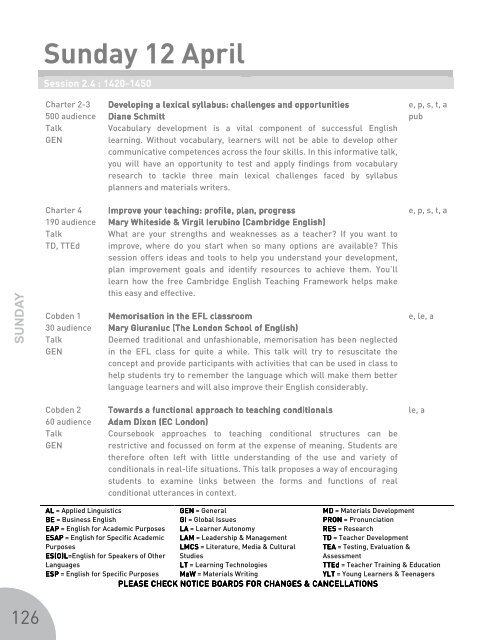You also want an ePaper? Increase the reach of your titles
YUMPU automatically turns print PDFs into web optimized ePapers that Google loves.
Sunday 12 April<br />
Session 2.4 : 1420-1450<br />
Charter 2-3<br />
500 audience<br />
Talk<br />
GEN<br />
Developing a lexical syllabus: challenges and opportunities<br />
Diane Schmitt<br />
Vocabulary development is a vital component of successful English<br />
learning. Without vocabulary, learners will not be able to develop other<br />
communicative competences across the four skills. In this informative talk,<br />
you will have an opportunity to test and apply findings from vocabulary<br />
research to tackle three main lexical challenges faced by syllabus<br />
planners and materials writers.<br />
e, p, s, t, a<br />
pub<br />
SUNDAY<br />
Charter 4<br />
190 audience<br />
Talk<br />
TD, TTEd<br />
Cobden 1<br />
30 audience<br />
Talk<br />
GEN<br />
Improve your teaching: profile, plan, progress<br />
Mary Whiteside & Virgil Ierubino (Cambridge English)<br />
What are your strengths and weaknesses as a teacher? If you want to<br />
improve, where do you start when so many options are available? This<br />
session offers ideas and tools to help you understand your development,<br />
plan improvement goals and identify resources to achieve them. You’ll<br />
learn how the free Cambridge English Teaching Framework helps make<br />
this easy and effective.<br />
Memorisation in the EFL classroom<br />
Mary Giuraniuc (The<br />
London School of English)<br />
Deemed traditional and unfashionable, memorisation has been neglected<br />
in the EFL class for quite a while. This talk will try to resuscitate the<br />
concept and provide participants with activities that can be used in class to<br />
help students try to remember the language which will make them better<br />
language learners and will also improve their English considerably.<br />
e, p, s, t, a<br />
e, le, a<br />
Cobden 2<br />
60 audience<br />
Talk<br />
GEN<br />
Towards a functional approach to teaching conditionals<br />
Adam Dixon (EC London)<br />
Coursebook approaches to teaching conditional structures can be<br />
restrictive and focussed on form at the expense of meaning. Students are<br />
therefore often left with little understanding of the use and variety of<br />
conditionals in real-life situations. This talk proposes a way of encouraging<br />
students to examine links between the forms and functions of real<br />
conditional utterances in context.<br />
le, a<br />
AL = Applied Linguistics<br />
BE = Business English<br />
EAP = English for Academic Purposes<br />
ESAP = English for Specific Academic<br />
Purposes<br />
ES(O)L=English for Speakers of Other<br />
Languages<br />
ESP = English for Specific Purposes<br />
GEN = General<br />
GI = Global Issues<br />
LA = Learner Autonomy<br />
LAM = Leadership & Management<br />
LMCS = Literature, Media & Cultural<br />
Studies<br />
LT = Learning Technologies<br />
MaW = Materials Writing<br />
MD = Materials Development<br />
PRON = Pronunciation<br />
RES = Research<br />
TD = Teacher Development<br />
TEA = Testing, Evaluation &<br />
Assessment<br />
TTEd = Teacher Training & Education<br />
YLT = Young Learners & Teenagers<br />
PLEASE CHECK NOTICE BOARDS FOR CHANGES & CANCELLATIONS<br />
126


